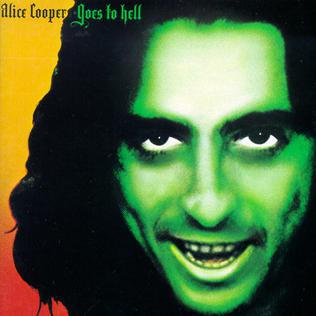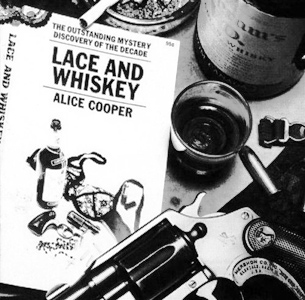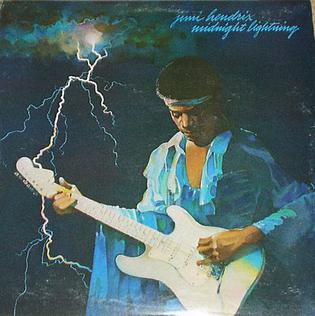
Catherine Louise Sagal is an American actress and singer. She is known for playing Peggy Bundy on Married... with Children (1987–1997), Leela on Futurama, Cate Hennessy on 8 Simple Rules (2002–2005), Gemma Teller Morrow on the FX series Sons of Anarchy (2008–2014), for which she won the Golden Globe Award for Best Actress – Television Series Drama in 2011, and Louise Goldufski-Conner on The Conners (2018–present).

Robert Andrew Kreinar, known as Bob Babbitt, was an American bassist, most famous for his work as a member of Motown Records' studio band, the Funk Brothers, from 1966 to 1972, as well as his tenure as part of MFSB for Philadelphia International Records afterwards. Also in 1968, with Mike Campbell, Ray Monette and Andrew Smith, he formed the band Scorpion, which lasted until 1970. He is ranked number 59 on Bass Player magazine's list of "The 100 Greatest Bass Players of All Time".

Alice Cooper Goes to Hell is the second solo studio album by American rock musician Alice Cooper, released in 1976. A continuation of Welcome to My Nightmare as it continues the story of Steven, the concept album was written by Cooper with guitar player Dick Wagner and producer Bob Ezrin.

Lace and Whiskey is the third solo and tenth overall studio album by American rock singer Alice Cooper, released on April 29, 1977, by Warner Bros. Records.

Gene Simmons is the first solo album by Gene Simmons, the bassist and co-lead vocalist of the hard rock band Kiss. It is one of four solo albums released by each member of Kiss, but yet still under the Kiss label, coming out alongside Peter Criss, Ace Frehley, and Paul Stanley. It was released on September 18, 1978. Reaching number 22 on the US Billboard 200 albums chart, it was the highest-placing of all the four Kiss solo albums. Mainly a hard rock style album, it also features choirs and string arrangements on some songs, as well as incorporating various musical genres including Beatles-inspired pop, 1970s funk, and rock and roll.

Peter Criss is the first solo album by Peter Criss, the drummer of American hard rock band Kiss. It was one of four solo albums released by the members of Kiss on September 18, 1978, but yet under the Kiss label, coming out alongside Ace Frehley, Gene Simmons and Paul Stanley. The album was produced by Vini Poncia, who went on to produce Dynasty (1979) and Unmasked (1980) for Kiss.

Barry Manilow II is the second studio album by Barry Manilow released in 1974. Propelled by the major success of its lead single "Mandy" and featuring a further international hit in "It's a Miracle", the album was a commercial breakthrough for Manilow. First issued by Bell Records, it was reissued after the company was reorganized into Arista Records. The album's success spawned a notable parody in the picture sleeve of Ray Stevens' 1979 single, "I Need Your Help Barry Manilow".

Double Fun is the fourth solo album by Robert Palmer, released in 1978. Self-produced, this pop album is influenced by multiple genres including blue-eyed soul, disco and heavy rock but maintains an overall consistency of production which holds it all together. The album peaked at number 45 on the Billboard Pop Albums chart in 1978, his highest rank up to that point, and includes a top 20 hit, "Every Kinda People".

Crash Landing is a posthumous compilation album by American guitarist Jimi Hendrix. It was released in March and August 1975 in the US and the UK respectively. It was the first Hendrix album to be produced by Alan Douglas.

Midnight Lightning is a posthumous compilation album by American rock guitarist Jimi Hendrix. It was released in November 1975 by Reprise Records in the US and Polydor Records in the UK. It was the second to be produced by Alan Douglas and Tony Bongiovi and contains demo-type recordings that were overdubbed with musicians who had never played with Hendrix. Despite including reworkings of the popular live songs "Hear My Train" and "Machine Gun", the album was not as well received as its predecessor, peaking at numbers 43 in the US and 46 in the UK.
"Every Kinda People" is a song originally performed by English singer Robert Palmer on his 1978 album Double Fun. It was released as the album's lead single in March 1978. The song was written by Andy Fraser.

Experience Gloria Gaynor is the second album by Gloria Gaynor, released in 1975 on MGM Records. The album charted in the US Billboard at #64 in the US Pop chart, and at #32 in the US R&B chart. The album failed to chart in the UK, the single "How High The Moon" was issued in the UK and peaked at #33.

I've Got You is the third album by vocalist Gloria Gaynor released in 1976. It was her first on Polydor Records, which had absorbed her previous label MGM Records and soon became a force in the disco genre. The album charted in the US Billboard at #107 in the US Pop chart and at #40 in the US R&B chart.

Read My Lips is the debut solo album by Tim Curry, released in 1978. It was produced by Bob Ezrin with Michael Kamen as the associate producer. The opening track "Birds of a Feather" had already appeared a year earlier in 1977, performed by its composers Carole Pope and Kevan Staples on Rough Trade Live! Direct to Disc, the debut album of their band Rough Trade. The song "Sloe Gin" was covered by Joe Bonamassa in 2007 on his album of the same title.
American country music singer Glen Campbell released fifteen video albums and was featured in twenty-one music videos in his lifetime. His first two music videos, "By the Time I Get to Phoenix" and "Wichita Lineman", were directed by Gene Weed in 1967 and 1968 respectively. Campbell released his final music video, "I'm Not Gonna Miss You", in 2014 to coincide with the release of the documentary Glen Campbell: I'll Be Me.

Fearless is the second album by the English actor/singer Tim Curry. Released in 1979, it was his most commercially successful album, reaching #53 on the U.S. Billboard 200 album chart.

Baby Come Out Tonight is the second album by American singer Kathy McCord, released in 1979 by Manhattan Records.

Desire Wire is the debut album by American singer-songwriter and musician Cidny Bullens, released in 1978 on United Artists Records. It was produced by Tony Bongiovi and Lance Quinn.

Lady Put the Light Out is an album by Frankie Valli, released in November 1977. It was his final album for Private Stock Records, which folded in early 1978.
















